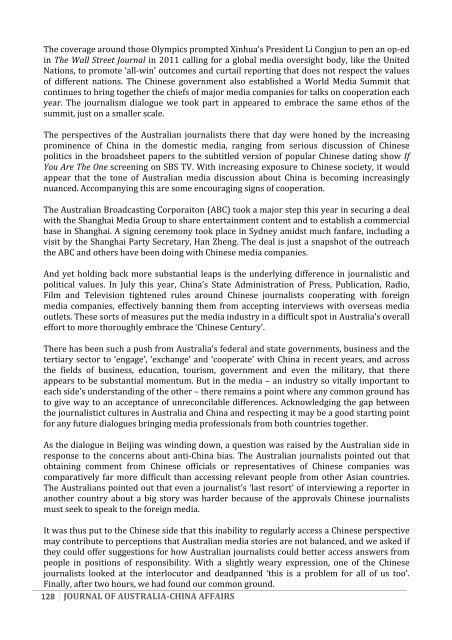Journal of Australia-China Affairs 2014
Journal of Australia-China Affairs 2014
Journal of Australia-China Affairs 2014
Create successful ePaper yourself
Turn your PDF publications into a flip-book with our unique Google optimized e-Paper software.
The coverage around those Olympics prompted Xinhua’s President Li Congjun to pen an op-‐ed in The Wall Street <strong>Journal</strong> in 2011 calling for a global media oversight body, like the United Nations, to promote ‘all-‐win’ outcomes and curtail reporting that does not respect the values <strong>of</strong> different nations. The Chinese government also established a World Media Summit that continues to bring together the chiefs <strong>of</strong> major media companies for talks on cooperation each year. The journalism dialogue we took part in appeared to embrace the same ethos <strong>of</strong> the summit, just on a smaller scale. The perspectives <strong>of</strong> the <strong>Australia</strong>n journalists there that day were honed by the increasing prominence <strong>of</strong> <strong>China</strong> in the domestic media, ranging from serious discussion <strong>of</strong> Chinese politics in the broadsheet papers to the subtitled version <strong>of</strong> popular Chinese dating show If You Are The One screening on SBS TV. With increasing exposure to Chinese society, it would appear that the tone <strong>of</strong> <strong>Australia</strong>n media discussion about <strong>China</strong> is becoming increasingly nuanced. Accompanying this are some encouraging signs <strong>of</strong> cooperation. The <strong>Australia</strong>n Broadcasting Corporaiton (ABC) took a major step this year in securing a deal with the Shanghai Media Group to share entertainment content and to establish a commercial base in Shanghai. A signing ceremony took place in Sydney amidst much fanfare, including a visit by the Shanghai Party Secretary, Han Zheng. The deal is just a snapshot <strong>of</strong> the outreach the ABC and others have been doing with Chinese media companies. And yet holding back more substantial leaps is the underlying difference in journalistic and political values. In July this year, <strong>China</strong>’s State Administration <strong>of</strong> Press, Publication, Radio, Film and Television tightened rules around Chinese journalists cooperating with foreign media companies, effectively banning them from accepting interviews with overseas media outlets. These sorts <strong>of</strong> measures put the media industry in a difficult spot in <strong>Australia</strong>’s overall effort to more thoroughly embrace the ‘Chinese Century’. There has been such a push from <strong>Australia</strong>’s federal and state governments, business and the tertiary sector to ‘engage’, ‘exchange’ and ‘cooperate’ with <strong>China</strong> in recent years, and across the fields <strong>of</strong> business, education, tourism, government and even the military, that there appears to be substantial momentum. But in the media – an industry so vitally important to each side’s understanding <strong>of</strong> the other – there remains a point where any common ground has to give way to an acceptance <strong>of</strong> unreconcilable differences. Acknowledging the gap between the journalistict cultures in <strong>Australia</strong> and <strong>China</strong> and respecting it may be a good starting point for any future dialogues bringing media pr<strong>of</strong>essionals from both countries together. As the dialogue in Beijing was winding down, a question was raised by the <strong>Australia</strong>n side in response to the concerns about anti-‐<strong>China</strong> bias. The <strong>Australia</strong>n journalists pointed out that obtaining comment from Chinese <strong>of</strong>ficials or representatives <strong>of</strong> Chinese companies was comparatively far more difficult than accessing relevant people from other Asian countries. The <strong>Australia</strong>ns pointed out that even a journalist’s ‘last resort’ <strong>of</strong> interviewing a reporter in another country about a big story was harder because <strong>of</strong> the approvals Chinese journalists must seek to speak to the foreign media. It was thus put to the Chinese side that this inability to regularly access a Chinese perspective may contribute to perceptions that <strong>Australia</strong>n media stories are not balanced, and we asked if they could <strong>of</strong>fer suggestions for how <strong>Australia</strong>n journalists could better access answers from people in positions <strong>of</strong> responsibility. With a slightly weary expression, one <strong>of</strong> the Chinese journalists looked at the interlocutor and deadpanned ‘this is a problem for all <strong>of</strong> us too’. Finally, after two hours, we had found our common ground. 128 JOURNAL OF AUSTRALIA-‐CHINA AFFAIRS


